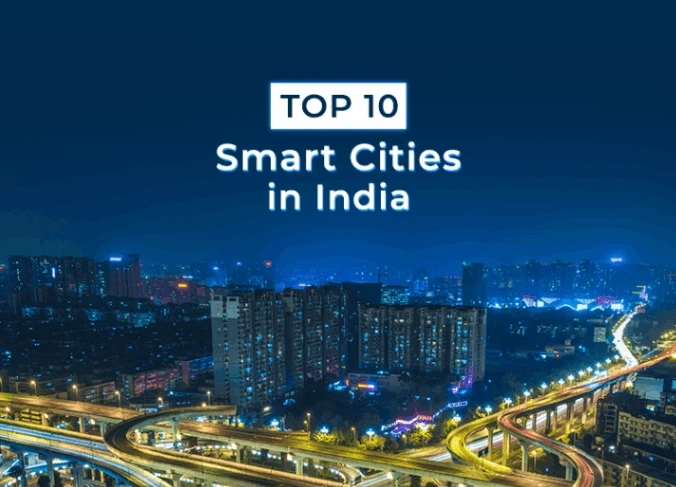India\'s urban landscape is rapidly evolving, with smart cities leading the charge toward a more connected, efficient, and sustainable future. The Smart Cities Mission, launched by the Indian government, aims to promote sustainable and inclusive urban development by leveraging technology, data, and innovation. Here’s a look at how the top 10 smart cities in India are transforming urban living:
1. Ahmedabad: A Hub of Intelligent Transport and Green Initiatives
Ahmedabad, one of India\'s major cities, has become a model of sustainable urban mobility. The city has implemented an intelligent transport system (ITS) that includes a comprehensive bus rapid transit (BRT) network, GPS-enabled public buses, and a robust traffic management system. This has significantly reduced traffic congestion and improved public transport efficiency. Ahmedabad is also making strides in waste management and renewable energy, with initiatives like the Sabarmati Riverfront Development Project promoting green spaces and sustainable urban infrastructure.
2. Pune: Pioneering Digital Governance and Smart Health Services
Pune is at the forefront of integrating digital solutions into governance and public services. The city\'s Smart Governance initiative provides residents with access to numerous services online, from paying bills to accessing government documents. Pune\'s emphasis on smart healthcare is also noteworthy, with e-health services, telemedicine, and smart hospitals improving healthcare delivery and accessibility. Additionally, Pune\'s investment in smart water management systems ensures efficient water distribution and conservation.
3. Bengaluru: The Silicon Valley of India Embracing IoT and Data Analytics
Bengaluru, known for its thriving IT industry, is leveraging its tech-savvy ecosystem to become a smart city. The city uses IoT (Internet of Things) devices and data analytics to monitor and manage public utilities, traffic, and safety. For instance, smart streetlights adjust their brightness based on real-time conditions, saving energy. Bengaluru\'s focus on digital infrastructure extends to its efforts in developing a smart grid, enhancing energy efficiency, and promoting the use of renewable energy sources.
4. Hyderabad: A Leader in Smart Public Safety and Infrastructure
Hyderabad is emerging as a leader in smart public safety and infrastructure. The city\'s Integrated Command and Control Centre (ICCC) monitors various aspects of urban management, including traffic, weather, and emergency responses. Hyderabad has also introduced smart policing initiatives, such as surveillance cameras and predictive analytics, to enhance public safety. Furthermore, the city\'s focus on smart infrastructure includes the development of smart roads with real-time traffic monitoring and efficient street lighting.
5. Chennai: Enhancing Urban Mobility and Disaster Management
Chennai is making significant strides in urban mobility and disaster management. The city has implemented smart traffic management systems to reduce congestion and improve road safety. Chennai\'s efforts in disaster management are also commendable, with the city deploying early warning systems and emergency response mechanisms to mitigate the impact of natural disasters like floods and cyclones. The integration of smart water management systems has also helped Chennai address its water scarcity issues.
6. Surat: A Model of Urban Sanitation and E-Governance
Surat has been a pioneer in urban sanitation and e-governance. The city\'s smart waste management system includes GPS-enabled garbage trucks and real-time tracking of waste collection. Surat\'s e-governance initiatives provide residents with online access to various civic services, making the city\'s administration more transparent and efficient. Surat\'s focus on cleanliness and efficient governance has made it one of the cleanest cities in India.
7. Kochi: Promoting Sustainable Urban Development and Smart Mobility
Kochi, known for its beautiful backwaters, is embracing sustainable urban development and smart mobility. The city has implemented a multi-modal transport system, including water metro services, to reduce traffic congestion and promote eco-friendly transport. Kochi\'s smart city projects also include the development of green buildings and the use of renewable energy sources. The city\'s emphasis on sustainable development is evident in its efforts to promote solar energy and rainwater harvesting.
8. Jaipur: Integrating Heritage with Modern Technology
Jaipur, a city rich in cultural heritage, is integrating modern technology to enhance urban living. The city\'s smart city initiatives include the installation of smart kiosks, Wi-Fi hotspots, and digital signages that provide tourists and residents with real-time information. Jaipur\'s focus on smart lighting and surveillance has improved public safety and energy efficiency. The city\'s efforts to digitize heritage sites and promote cultural tourism are also noteworthy, blending tradition with innovation.
9. Indore: Leading in Cleanliness and Public Services
Indore has consistently been ranked as one of the cleanest cities in India, thanks to its innovative waste management practices. The city has implemented a smart waste segregation and collection system, ensuring efficient waste disposal. Indore\'s public services have also been digitized, making it easier for residents to access various civic amenities. The city\'s focus on cleanliness and efficient public services has set a benchmark for other Indian cities.
10. Nagpur: A Pioneer in Smart Transport and Energy Efficiency
Nagpur is setting new standards in smart transport and energy efficiency. The city\'s Intelligent Traffic Management System (ITMS) uses advanced technologies to monitor and manage traffic flow, reducing congestion and improving road safety. Nagpur\'s focus on renewable energy includes the installation of solar panels on public buildings and the development of a smart grid. The city\'s emphasis on energy efficiency extends to its public transport system, with the introduction of electric buses.
Conclusion
The transformation of these top 10 smart cities in India highlights the potential of technology and innovation to address urban challenges and improve the quality of life for residents. From intelligent transport systems and smart governance to sustainable urban development and public safety, these cities are setting examples for the rest of the country. As India continues its journey towards becoming a digital nation, the success of these smart cities will play a crucial role in shaping the future of urban living.



